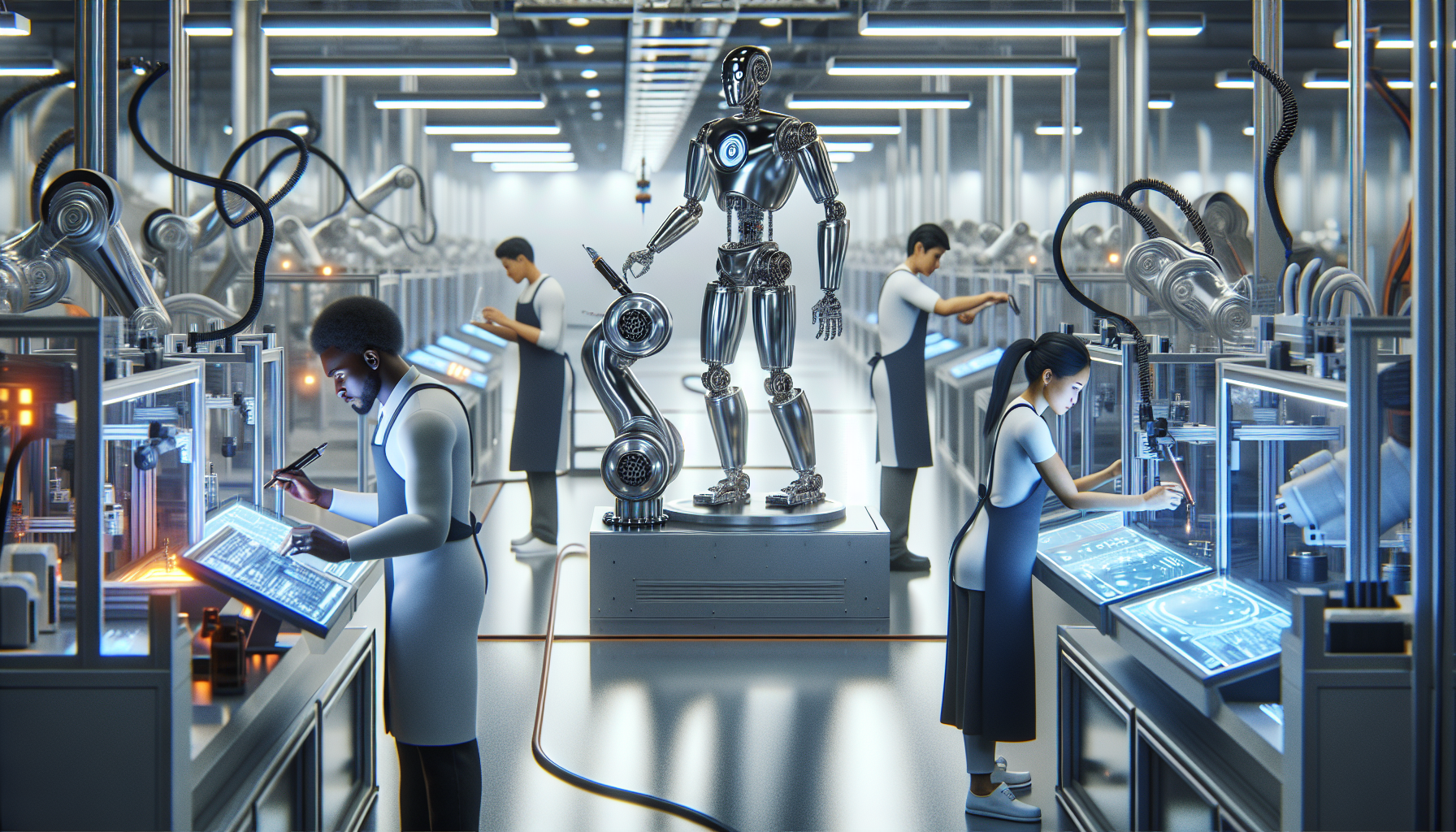How to Get a Job in Manufacturing in 2025: A Complete Career Guide
Meta: Discover proven strategies to launch your manufacturing career in 2025. Learn about required skills, training programs, and emerging opportunities in the evolving industrial sector.
Did you know that despite automation concerns, the manufacturing sector is projected to have 2.1 million unfilled jobs by 2025? I’ve spent years in manufacturing recruitment, and I can tell you – there’s never been a better time to enter this dynamic field! The industry is transforming with smart factories, sustainable practices, and advanced technologies creating exciting new career paths. Let’s explore how you can position yourself for success in tomorrow’s manufacturing landscape!

Understanding Today’s Manufacturing Landscape
The manufacturing industry has undergone significant changes in recent years. Let’s take a closer look at what’s happening in this dynamic sector.
“So, what’s new in manufacturing these days?” you might ask. Well, there’s a lot to unpack. For starters, we’re seeing some exciting growth areas, particularly in advanced manufacturing and sustainable production methods. Companies are increasingly focusing on eco-friendly practices and innovative materials.
When it comes to jobs, the landscape is quite diverse. “What kind of roles are available?” you wonder. Everything from traditional machine operators to highly specialized engineers and technicians. There’s also a growing demand for data analysts and IT professionals in manufacturing settings.
“I keep hearing about Industry 4.0. What’s that all about?” It’s a great question! Industry 4.0 refers to the fourth industrial revolution, which is all about digital transformation. We’re talking smart factories, interconnected systems, and data-driven decision-making. It’s changing the way products are made and how manufacturing businesses operate.
As for where the action is, there are several regional manufacturing hubs worth noting. “Are there specific areas I should be looking at?” Absolutely! Places like the Midwest in the US, parts of Germany, and certain regions in China and Southeast Asia are known for their strong manufacturing presence. However, with the rise of advanced manufacturing, new hubs are emerging in unexpected places, so keep an eye out!
Essential Skills for Manufacturing Careers in 2025
Now, let’s talk about what you need to succeed in this evolving industry. “What skills should I focus on?” you ask. Great question!
First up, technical skills. Depending on your specific role, you might need to know how to operate complex machinery, understand production processes, or work with specialized software. But here’s the kicker – digital literacy is becoming increasingly important across the board.
“What do you mean by digital literacy?” Well, it’s about being comfortable with digital tools and technologies. This could include everything from using tablets for data entry on the factory floor to analyzing production data using specialized software.
Don’t forget about soft skills, though! “Are those really important in manufacturing?” Absolutely! Teamwork, problem-solving, and adaptability are crucial in modern manufacturing environments. As processes become more complex and interconnected, being able to communicate effectively and work well with others is key.
Lastly, industry certifications can give you a real edge. “Any specific ones I should look into?” It depends on your area of focus, but certifications in lean manufacturing, Six Sigma, or specific software platforms can be valuable.
Education and Training Pathways
“So, how do I get the education and training I need?” There are several paths you can take, depending on your goals and circumstances.
Traditional degree programs in engineering, manufacturing technology, or related fields are still a solid choice. These provide a broad foundation and can open doors to a variety of roles.
But don’t overlook technical and vocational training options! Many community colleges and technical schools offer specialized programs that can get you job-ready in a shorter time frame.
“What about apprenticeships?” Great question! Apprenticeships are making a comeback in manufacturing. They offer a unique blend of on-the-job training and classroom instruction, often with a clear path to full-time employment.
For those who prefer flexibility or are looking to upskill, online learning platforms are a fantastic resource. “Any recommendations?” Platforms like Coursera, edX, and Udacity offer courses in everything from basic manufacturing principles to advanced topics like robotics and AI in manufacturing.
Breaking Into the Manufacturing Industry
“Okay, I’m getting trained up. Now how do I actually land a job?” Let’s break it down.
Entry-level positions are a great way to get your foot in the door. Look for roles like production assistant, quality control technician, or junior machinist. These positions can provide valuable experience and often lead to advancement opportunities.
Networking is crucial in manufacturing, just like in any industry. “But how do I network effectively?” Attend industry events, join professional associations, and don’t be shy about reaching out to people on LinkedIn. Many manufacturers also offer plant tours or open houses – these can be great opportunities to make connections.
When it comes to job searching, use a mix of strategies. Online job boards are useful, but don’t neglect company websites and local job fairs. Many manufacturing jobs are filled through word-of-mouth or internal referrals, so networking can really pay off.
For your resume and interviews, focus on highlighting relevant skills and experiences. “Any specific tips?” Be sure to mention any hands-on projects you’ve worked on, internships or apprenticeships you’ve completed, and any relevant certifications. In interviews, be prepared to discuss specific examples of problem-solving or teamwork – these are highly valued in manufacturing environments.
Advanced Manufacturing Technologies to Know
“I keep hearing about all these new technologies. Which ones should I be familiar with?” Great question! Let’s dive into some of the key technologies shaping the future of manufacturing.
Robotics and automation systems are becoming increasingly common in manufacturing settings. These aren’t just simple assembly line robots anymore – we’re talking about sophisticated systems that can adapt to different tasks and work alongside human workers.
AI and machine learning are also making waves in manufacturing. “How are these being used?” They’re being applied in everything from predictive maintenance (anticipating when machines will need repairs) to quality control and supply chain optimization.
The Internet of Things (IoT) and connected systems are transforming factories into smart, data-driven environments. Sensors on machines can provide real-time data on performance and output, allowing for more efficient operations.
“What’s this digital twin technology I’ve been hearing about?” Digital twins are virtual replicas of physical products or processes. They’re used for testing and optimization in a virtual environment before changes are implemented in the real world. It’s a powerful tool for innovation and problem-solving in manufacturing.
Building a Long-term Manufacturing Career
“So, how do I turn this into a long-term career?” Great question! Let’s look at some strategies for building a sustainable career in manufacturing.
Career advancement opportunities in manufacturing can be quite diverse. You might move up within a specific technical track, transition into a management role, or even shift into areas like supply chain management or research and development.
Continuing education is key in this rapidly evolving field. “What kind of ongoing learning should I be doing?” Stay up-to-date with industry trends, new technologies, and best practices. This might involve attending workshops, pursuing additional certifications, or even going back to school for an advanced degree.
Professional development isn’t just about formal education, though. “What else can I do?” Seek out mentors in your organization or industry. Take on challenging projects that stretch your skills. Consider cross-training in different areas of the manufacturing process to broaden your expertise.
Lastly, don’t underestimate the value of industry associations and memberships. “Are these really worth it?” Absolutely! They can provide networking opportunities, access to industry research and trends, and often offer their own professional development resources. Plus, active involvement in these organizations can boost your professional profile and open up new career opportunities.

Conclusion
Wrap up with actionable steps for starting a manufacturing career journey, emphasizing the importance of continuous learning and adaptability. Include a motivational call to action encouraging readers to take their first step toward a manufacturing career.




